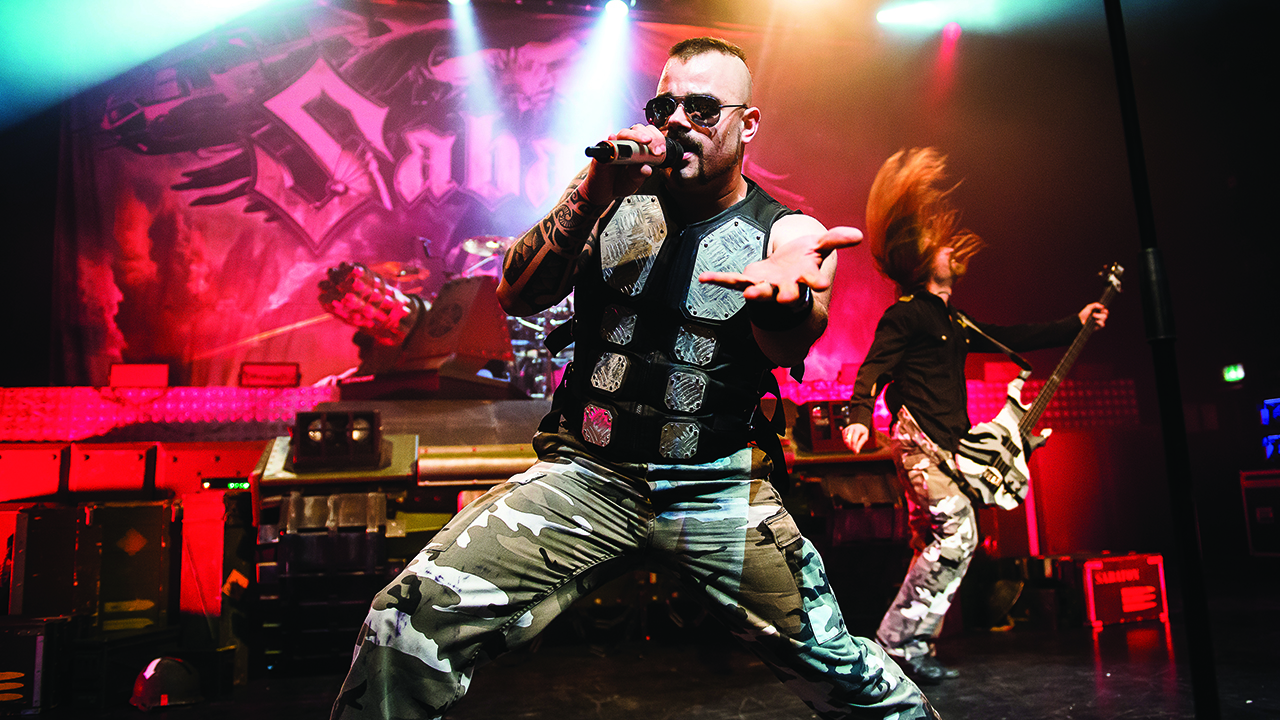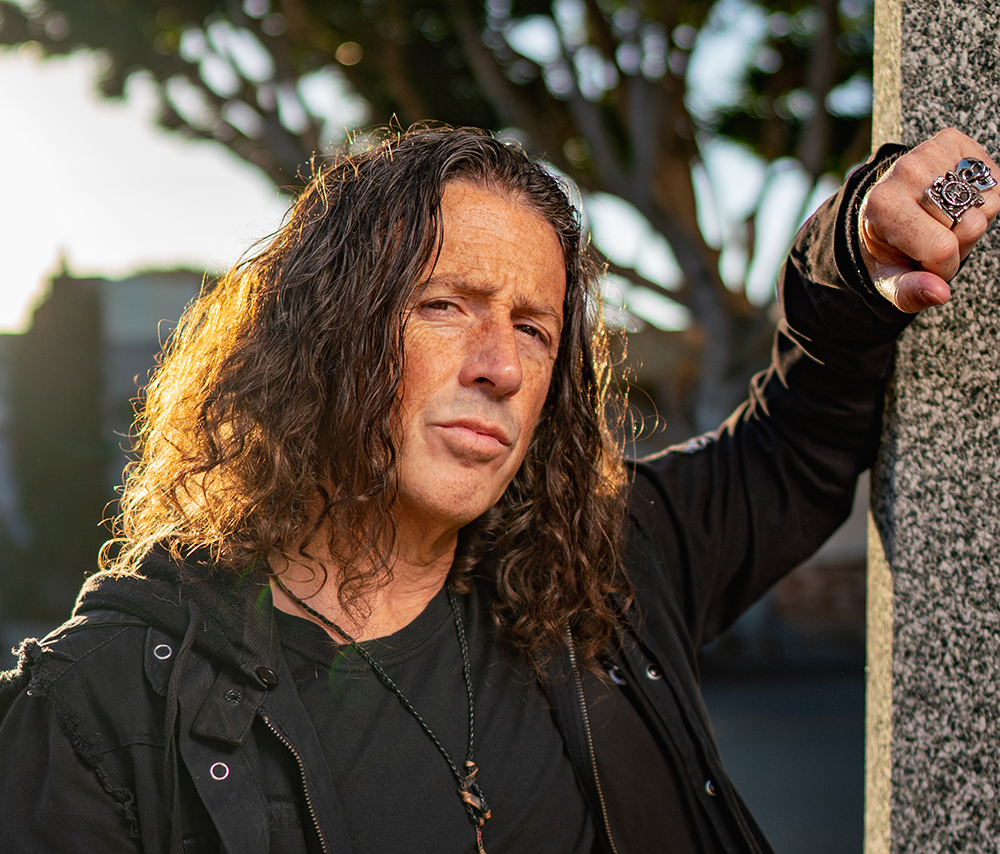Somewhere in the middle of Sweden, back in 1984…
Standing in the kitchen, a young mother prepares dinner for her husband and two small children, when a boy’s sharp howl tears through the tranquillity like a rusted machete. Her mind racing to the worst possible case, she darts into the living room to find her four-year-old son standing in front of the television, whirling and shrieking with delight at the sneering, painted visage of Dee Snider. So begins the origin story of one of metal’s favourite frontmen – Sabaton’s sunglasses-shrouded badass, Joakim Brodén.
“She heard me scream and started freaking out, thinking, ‘Oh my god! My baby’s dying!’” The singer roars with laughter as he recalls the scene. “She ran into the living room and there I was in front of the television, not hurt at all. I was just freaking out to the video for I Wanna Rock or We’re Not Gonna Take It. We’re not sure which one, but she went out and bought me the album. Now that’s a cool mum!”
This afternoon, we find the frontman preparing for a show in Mexico City. Although he should be resting his voice, the charismatic singer can’t help but regale us with one story after another about growing up in his native Sweden. Occasionally we hear rock stars praised as “surprisingly humble” or “refreshingly down-to-earth”, but Joakim is the down-to-earthiest of them all. Despite his commanding stage presence, the singer is as friendly and chilled-out as you like. He laughs easily and often – generally at himself – and he speaks without an ounce of self-styled grandiosity. Which is not to say he’s a choirboy – although as we soon discover, that’s not too far off, either…
Much of Joakim’s lack of pretence undoubtedly stems from a stable childhood with his parents and sister in Falun, an old mining city nestled in the middle of Sweden. “I grew up with a fairly normal Swedish upbringing,” he recalls. The singer’s first instrument was neither guitar, drums nor microphone, but that sturdy classic rock standby, the Hammond organ. “I played through my school years and eventually I played organ in church.” Wait, church? Joakim explains: “Even though I’m not a religious person, I think that a church organ is a very powerful instrument. I played at weddings and things like that. I actually got into Sabaton because they wanted a keyboard player. So I got in and wrote songs and they said, ‘Hey, can you do a vocal melody?’ And I said, ‘Yeah, but I can’t sing.’ They said, ‘Well, we’ll use you until we find a singer.’ Seventeen-and-a-half years later…”

Pär Sundström, Sabaton’s bassist and co-founder, picks up the story, recalling, “We all tried out to sing but none of us had a good voice. Joakim had written some songs and when he tried out, I thought he had a cool voice, so I voted for him. I thought he should be the singer because at that time, death metal was the biggest thing around in Sweden – melodic metal had not yet returned – so I thought that having a guy with rougher vocals could help us a lot.”
Whereas some bands pursue rock stardom with the drooling, single-minded intensity of lions bearing down on a herd of zebra, Joakim managed more modest expectations. Indeed, Sabaton’s rise from a beer-sodden Judas Priest covers band to one of Europe’s biggest metal draws might never have occurred had Joakim’s old boss been more flexible. “I was working in a phone exchange, like they had back in the day. We had an offer in 2006 to support Dragonforce all over Europe for a five- or six-week tour and my boss wouldn’t give me time off of work! So I just said, ‘Well, then I quit.’ He said, ‘You can’t do that!’ but I just walked out and that was it.”
As Sabaton are virtually synonymous with military history, one might reasonably presume Joakim to be a maniacal history buff from way back, but he assures us that this was never the case. “If you ask my history teacher from high school, he’s going to say that I was useless, ha ha! My fascination with history didn’t really develop until 2004, when we were recording Primo Victoria. Pär and I sat down to write the lyrics. We already had the music and the title song had a big sound to it. We realised we couldn’t just write about shagging birds or killing dragons or drinking beer. We needed something serious for this song, and so that was one of the first songs where we wrote about military history – the D-Day landing at Normandy Beach on 6th June, 1944. We looked at each other and said, ‘Man, we should do the whole album about war!’ After we did the album, we decided to stick with it.”
- Sabaton welcome new guitarist Tommy Johansson
- Sabaton Quiz
- The 10 albums that changed my life, by Sabaton's Joakim Brodén
- Sabaton: picking their battles for The Last Stand
Last year, Sabaton released their eighth studio outing, The Last Stand, which unsurprisingly focused on history’s greatest last stands. It’s their heaviest and most diverse outing yet.
“It’s a little bit of everything,” Joakim agrees. “This is a Sabaton album, but it’s the most varied album we’ve ever released. We’ve got some songs in a major key instead of minor, and we have songs that are faster and more aggressive than usual.”
It’s only the second record to feature guitarists Chris Rörland and Tommy Johansson, and drummer Hannes Van Dahl, following an exodus in 2012 that left Joakim and Pär as the only original members. They’ve had a lot more influence this time.
“This album marked the biggest evolution in our sound in a long time,” Pär adds. “All bandmembers had much more input into this album than in the past.”
A true anomaly in our scene, the Swedes have endured an unending march on metal’s upper ranks that has seen them rise from curious battle metal oddities to hugely popular live band to one of the biggest metal acts in all of Europe. While many of their ilk have struggled to translate that success to UK shores, Sabaton’s immense live show – which, yes, features that tank – has gone on to fill bigger and bigger venues with each passing year, from show-stealing turns on festival main stages to bringing the house down at some of Britain’s most popular venues. In an era where we’re often found asking where metal’s next Big Hitters are coming from, Sabaton have slowly but surely (though, to be fair, let it never be said quietly) infiltrated our big leagues, right in front of our noses.
And, thankfully, 2017 will see their decade-plus campaign continue into new heights, as Sabaton launch a sprawling world tour in support of The Last Stand, including their headlining debut at Brixton in London this month. That’s Brixton fucking Academy. The same venue that has in recent years hosted the likes of Architects, Parkway Drive, Rob Zombie and Slayer. Joakim hopes it’ll be one for the ages. “I’m really looking forward to it because we can finally bring our full production to the UK,” he says. “We’ve had tanks and a bit of pyro before, but we’re usually tight on time and there’s not much space on the stage. The plan is to bring everything we’ve got. Full fucking production, and that’s going to be amazing.”
The little boy squealing with delight to the fuzzy power chords of I Wanna Rock now fronts one of the most enthralling live bands in Europe, decked out in his trademark shades, armour-plated suits and surrounded by tanks, pyro and flamethrowers. And yet despite his skyrocketing fame, Joakim’s ambitions for the new year reflect the very same blue collar work ethic that he brought into the band. “This might sound a bit cocky, but I say this humbly: I want to be able to go around the world and play arenas to prove that we belong there.” As Sabaton regularly fill 10,000-seat arenas across Europe, this goal stands well within kicking distance.
When asked where he’d like to see his band in 10 years’ time, the singer demurs, saying simply, “Our only focus should be making the best albums we can and playing the best fucking metal shows we can do. If we’re still having fun and making a living out of it, I don’t fucking care.”
As Sabaton prepare for their biggest year yet, it’s clear that their last stand is still a long, long, long way off. In fact, as 2017 rolls on, it might become more clear than ever that they’re one of the most important bands we have.

